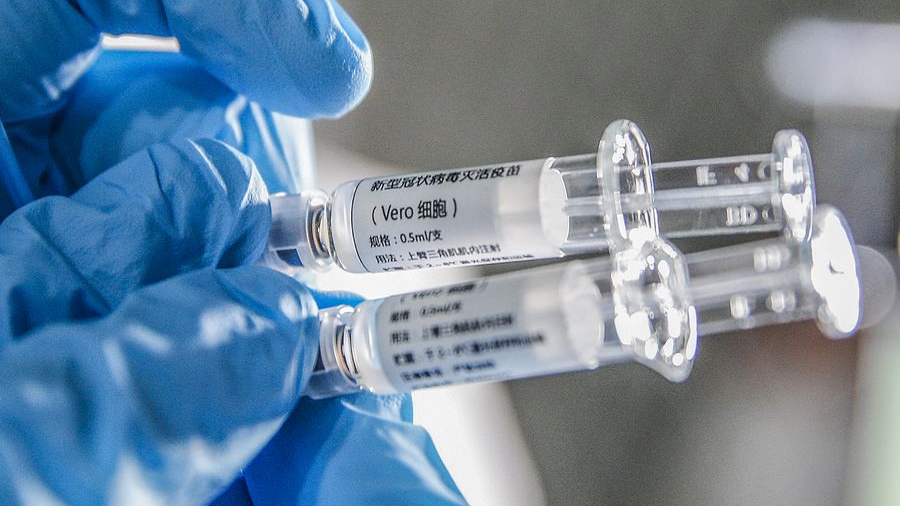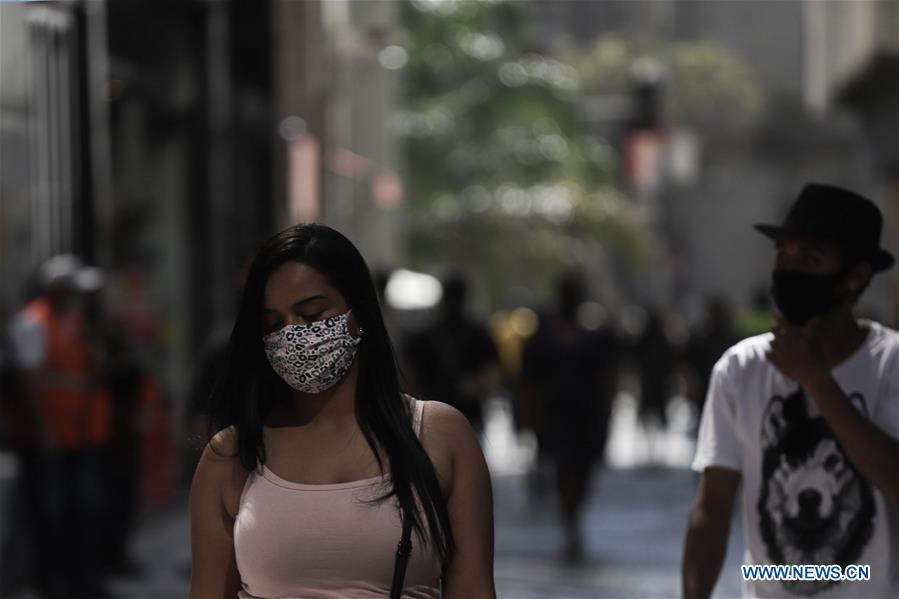
A staff member displays samples of the inactivated COVID-19 vaccine at Sinovac Biotech Ltd. in Beijing, capital of China, March 16, 2020. /Xinhua
A staff member displays samples of the inactivated COVID-19 vaccine at Sinovac Biotech Ltd. in Beijing, capital of China, March 16, 2020. /Xinhua
Editor's note: Hannan Hussain is a foreign affairs commentator and author. He is a Fulbright recipient at the University of Maryland and a former assistant researcher at the Islamabad Policy Research Institute. The article reflects the author's opinions and not necessarily the views of CGTN.
On October 30, Brazilian Vice President Hamilton Mourão reiterated the government's resolve to purchase Chinese biopharmaceutical company Sinovac's vaccine after domestic political dynamics cast undue skepticism over future progression.
Mourão's remarks arrive at a time when Antonio Barra Torres, the head of Brazil's health regulator Anvisa, also anticipates a COVID-19 vaccine by June 2021. Torres derives his optimism from a cluster of vaccine candidates being tested in Brazil, including CoronaVac, which continues to make sufficient headway in the country.
Preliminary results from a late-stage clinical trial in Brazil have shown that the vaccine is in line with safety standard expectations. Both Sinovac and Anvisa strike a common chord on the minimum acceptable thresholds for vaccine effectiveness.
At present, Anvisa remains fluid with its vaccine approval benchmarks, weighing the risks of committing to an efficacy rate under 50 percent. China reciprocates that strategic thinking by striving for optimum vaccine effectiveness thresholds across its global trials, a pursuit that aligns with Brazil's determination to develop breakthrough health advances during challenging times.
In an exclusive interview last month, Kusnandi Rusmil, who heads the COVID-19 vaccine clinical trial research team at Indonesia's Padjadjaran University, said his effectiveness target for the CoronaVac vaccine "is above 80 percent."
"Even though in some countries there are ones with only 50 percent [effectiveness], I want the vaccine in Indonesia to be 80 percent [effective] in order to lower the infection number," Rusmil said.
Underpinning this high-level forecasting is the absence of adverse vaccine side effects in CoronaVac, despite fears of the SARS-CoV-2 virus actively mutating in Indonesia. More importantly, a strong government consensus on CoronaVac's mass production prospects has bolstered the country's hopes of producing 250 million doses next year from as early as January.

Pedestrians wearing face masks seen on the street amid the COVID-19 outbreak in Sao Paulo, Brazil, September 3, 2020. /Xinhua
Pedestrians wearing face masks seen on the street amid the COVID-19 outbreak in Sao Paulo, Brazil, September 3, 2020. /Xinhua
Similar trajectories have marked China's vaccine cooperation with Brazil as well, and it serves the interests of Brazil's ruling elite to promote such positive intent across the political spectrum. Doing so would not only strengthen an enduring partnership but also boost long-term epidemic control and prevention commitments, especially in the face of increased foreign interference.
On the latter part, Washington's efforts to promote fears of China's alleged influence-building in Brazil have coincided with Brazil's subsequent opposition to Chinese vaccine purchases. Furthermore, U.S. Secretary of State Mike Pompeo has shown signs of conditioning U.S.-Brazil business ties on the need to "decrease… dependence for critical items" coming from China.
These moves, rightly identified by Beijing as an effort to "sow discord" between China and Brazil, demand judicious judgment on Brasilia's part as well so that both countries continue to reinforce the integrity of their bilateral relationship for all future times.
One of the immediate future goals is to navigate Brazil's soaring COVID-19 infection count, which has recently crossed the 5.5 million mark. Across select states, fresh spikes in new infections pose an additional challenge to the country's public health system, necessitating sustained citizen trust in the government's service delivery capabilities.
This trust surplus is bolstered by the breakneck pace of vaccine collaboration between Sinovac and the Butantan Institute of Brazil. The Brazilian government's determination to factor CoronaVac into its national immunization program is also a major plus for both countries. Moreover, Beijing's consistent supply of COVID-19 medical equipment to Brazil helps synchronize COVID-19 assistance with the emerging virus containment priorities of Brazilian public health professionals.
While the International Monetary Fund has identified historic economic contraction and rapid loss of livelihood in Brazil, a united front on Sinovac's vaccine progression is crucial to extending its prospective utility to 230 million people. The hopes of acquiring regulatory approval for the vaccine by the end of the year is also the right spirit to approach an increasingly fluid pandemic situation in Brazil.
However, for that commitment to deliver in full, Brazil must ensure an impediment-free environment for importing Sinovac's raw materials so that vaccine production can take its desired course in the country.
"The origin of the vaccine has no bearing for us, there is no prejudice," assured Brazil's health regulator chief in a Reuters interview this week.
By continuing to divorce vaccine development from politics, Brazil and China stand the best chance of benefiting from the prospective merits of a global public good.
(If you want to contribute and have specific expertise, please contact us at opinions@cgtn.com.)